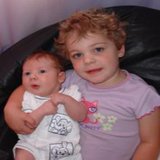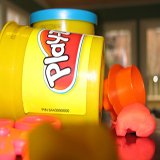Questions and Answers about Language Development in Children
Looking for more questions and answers about language development in children?
Here you will find exactly that.

Don't think that you are asking funny questions. The questions and answers about language development in children presented here are regarded as expert advice from real parents.
Please use this as a reference and share your insight and experience on language development in children at how to raise smart kids.
Questions and Answers about Language Development in Children
- How can I get my toddler to speak instead of pointing at what he wants?
You can't force your child to speak but you can encourage his language development by not reacting to his non-verbal gestures.
There is a greater incentive for him to speak when he finds that body language alone doesn't get the desired result. And when he does use words instead on pointing, always react quickly and praise his use of language.
- My child talks to himself. Is this normal?
Yes. One of the best ways for him to improve his language skill is through regular practice and what better way to practice free from interruption than by talking to himself?
You won't understand most of what he says during these self-directed monologues, but remember that his words are not intended for you to hear.
- My 21-month-old child has a stilted way of talking, as though abbreviating what she is saying. Is that typical for a child of this age?
Her language sounds abbreviated because it contains only the key words, such as 'want milk' or 'me sleep'.
Over the next year she starts to add in other types of words such as prepositions and adjectives. This is the way in which language development normally progresses over the months.
- My toddler speaks so hurriedly I can't make out what she says. What should I do?
She is just impatient to express herself. Over the next few months she naturally slows down her speech and it will become easier to understand what she is saying.
In the meantime, if she is over-excited when she speaks to you, try to encourage her to speak more slowly. But there is absolutely no cause for concern.
- Why is it that my child says 'f' for 's' and also says 't' for 'c'?
Say these sounds slowly yourself - you'll discover that 'f' and 't' involve your teeth, lips and the tip of your tongue, while 'c' and 's' involve the back of your mouth.
Your child finds front-of-mouth sounds much easier at this age and hence makes these substitutions. He will gradually master the whole range of sounds.
- Is it true that fairy stories can frighten a young child?
Some stories have the potential to frighten your child. That's why it is important to choose carefully the books that you want to read to him, to ensure the content is appropriate for his age and understanding.
He is unlikely to feel very positively about books an pictures if he experiences some that disturb him and make him afraid.
- What should we do about our child's lisp?
Many children develop a temporary lisp while they acquire speech (in other words, they substitute 'th' for 's', 'f' for 'th' and so on). In most instances this speech pattern disappears spontaneously as they grow older. If it persists, a little speech therapy might sort out the issue.
Therefore at this stage you should do nothing in particular, except provide appropriate speech patterns for her to copy.
- Is it true that boys are somewhat slower in learning to speak and spell than girls?
Evidence from psychological studies confirms that, in general, girls acquire spoken language at an earlier age than boys and they also develop more complex language structures before boys.
This is only a trend, though; it doesn't mean that every boy says his first world later than every girl. Much depends on the individual child.
- My 3 year old still only uses single words, without forming short sentences. Is this normal at this age?
The rate at which children acquire speech varies greatly. However, most children are further ahead with their language at this stage.
The chances are your child's speech will develop normally and that there is nothing to worry about. But you may find it reassuring to have a chat with your family doctor about this.
- At what age do children start understanding jokes?
Humor develops from birth - your child probably first smiled at around six weeks. The use of language as a means of stimulating laughter starts around the age of 2 years old.
Although your 3 year old jokes may not strike you as funny - perhaps because they simply involve words in an unusual order - they make your child giggle.
More Questions and Answers about Language Development in Children?
Let me know what other questions and answers about language development in children you would like to share with others on how to raise smart kids.
Find It!
Can't remember where you read something specific? Just type in your search term in the box below and your specific topic will be returned to you instantly.









